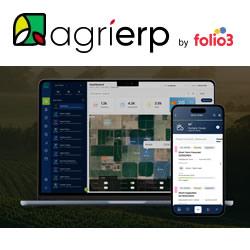GRO Network™ Brings Environmental Transparency to Grain Market
-Farmers Business NetworkSM launches new platform that environmentally scores grain, boosts farm revenues by providing buyers with direct access to verifiable Low-Carbon Grain producers -POET Ethanol Pursues Low-Carbon Grain Programs Through GRO Network™
Farmer's Business Network, Inc. (FBNSM), the leading direct-to-farm ag tech platform and farmer network, today launched GRO Network™, which provides new technology and services that facilitate the scoring, sourcing, and pricing of Low-Carbon Grain from farm to fork, making environmental transparency in the grain industry a reality now.
GRO Network enables comprehensive environmental transparency, and supports a market for premium, environmentally-scored grain. GRO Network also provides buying intelligence software that directly connects farmers with consumer packaged goods companies, animal feed providers, biofuel makers and the world's other major grain buyers.
POET, the world's largest producer of biofuels has joined GRO Network as a key customer in the market for verifiable Low-Carbon Grain.
"Family farms have already invested the time, innovation and sweat-equity to develop the regenerative practices required to grow Low-Carbon Grain," said Amol Deshpande, CEO and Co-Founder of FBN. "With GRO Network, the efforts of farmers as well as food and feed companies, biofuel makers, and ordinary consumers to reduce carbon emissions just got a huge boost."
Transparency in the agriculture supply chain starts with data direct from the field.
Farmers share information on their cultivation practices - including fertilizer applications, tillage, and cover cropping - with GRO Network, which is processed with artificial intelligence that leverage FBN's 240 million acre-events of real world farm data, validates and distills the practices into a single farm-level score. This single score - which is the only information shared between GRO Network and prospective buyers - informs the buyer to then source premium grain as well as build programs to meet unique sustainability goals, while protecting farmers' data privacy.
Importantly, verifiable Low-Carbon Grain will allow agricultural processors and food companies to meet their own significant emission goals. Policymakers will be able to evaluate a precise, farm-level carbon-intensity score to more accurately measure the GHG reduction of biofuels for low carbon fuel policies. GRO Network will help these companies embed the required carbon traceability into their supply chains, all within the current government policy framework.
"At POET we know that agriculture is the key to combating climate change, and we want to support farmers who share our mission to be good stewards of the earth by using environmentally friendly practices," said POET Founder and CEO Jeff Broin. "We are excited about the potential of the GRO Network to promote sustainable agriculture and utilize the resulting Low-Carbon Corn to produce even greener bioethanol and bioproducts."
GRO Network is focusing initially on carbon abatement, which, based on GRO Network pilots, can reduce grain emissions by up to 50%, while increasing farm revenues at the same time. It relies on proven, existing science and robust FBN analytics to measure the benefits of conservation activities on the farm, providing immediate, low-risk solutions to reduce the environmental impact of the agriculture supply chain.
"Regenerative agriculture techniques have not only saved us money, they've made us money," said Todd Hanten, who farms 3,000 acres of corn, soybeans and spring wheat in South Dakota. "We've always tried these practices side by side and can compare conventional tillage to no-till and strip till and we've realized the benefits through our data analytics. We're happy to find out that the practices we've adopted are saving us money and making us a better return."
FBN began development of GRO Network close to two years ago in order to allow fuel, food and feed companies to work alongside farmers to accelerate the adoption of regenerative agricultural practices that deliver the biggest impact. GRO Network incentivizes sustainable conservation and soil health practices by producers, ensuring a consistent supply of high quality, Low-Carbon Grain for buyers.
"Ultimately, GRO Network aligns farmers, processors, brands, consumers and policy-makers in the fight against climate change," Deshpande said. "We are excited to see family farm incomes improve as a direct result."
Learn more at www.fbngro.com
About FBN:
Farmer's Business Network, Inc. is an independent ag tech platform and farmer-to-farmer network with a mission to power the prosperity of family farmers around the world, while working towards a sustainable future. Its Farmers First® promise has attracted over 14,000 members to the network with a common goal of maximizing their farm's profit potential. FBN has set out to redefine value and convenience for farmers by helping reduce the cost of production and maximize the value of their crops.
The FBN network has grown to cover more than 40 million acres of member farms in the U.S., Canada and Australia. Blending the best of Midwestern agricultural roots and Silicon Valley technology, the company has over 600 personnel and offices in San Carlos, Calif., Chicago, Sioux Falls, S.D., a Canadian headquarters in High River, Alta., and an Australian headquarters in Perth.
To learn more, visit: www.fbn.com.
Copyright ©2020 Farmer's Business Network, Inc. All rights reserved. The sprout logo, "Farmers Business Network", "FBN", "Farmers First" and the Farmers First flag logo are registered service marks of Farmer's Business Network, Inc. All other marks are the property of their respective owners.
Copyright ©2020 GRO Network. All rights reserved. "GRO Network" and the GRO Network logo are registered trademarks of GRO Network.
Featured Product

